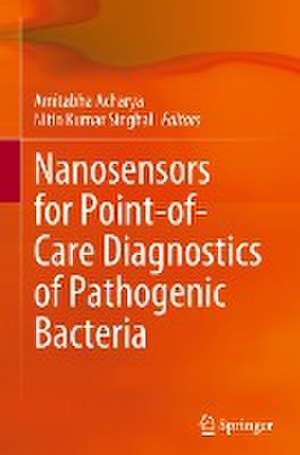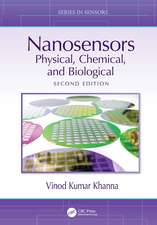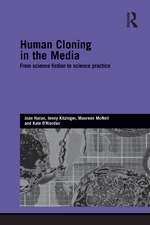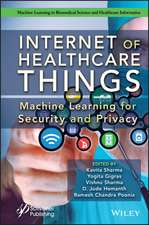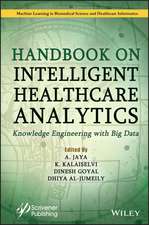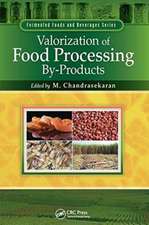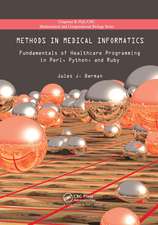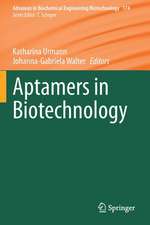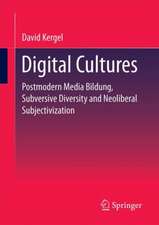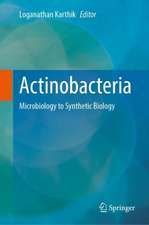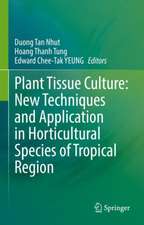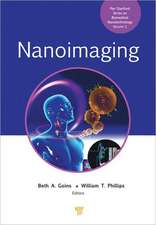Nanosensors for Point-of-Care Diagnostics of Pathogenic Bacteria
Editat de Amitabha Acharya, Nitin Kumar Singhalen Limba Engleză Hardback – 16 iun 2023
Preț: 1108.99 lei
Preț vechi: 1352.42 lei
-18% Nou
Puncte Express: 1663
Preț estimativ în valută:
212.20€ • 221.56$ • 175.63£
212.20€ • 221.56$ • 175.63£
Carte tipărită la comandă
Livrare economică 05-19 aprilie
Preluare comenzi: 021 569.72.76
Specificații
ISBN-13: 9789819912179
ISBN-10: 9819912172
Ilustrații: XI, 179 p. 1 illus.
Dimensiuni: 155 x 235 mm
Greutate: 0.45 kg
Ediția:2023
Editura: Springer Nature Singapore
Colecția Springer
Locul publicării:Singapore, Singapore
ISBN-10: 9819912172
Ilustrații: XI, 179 p. 1 illus.
Dimensiuni: 155 x 235 mm
Greutate: 0.45 kg
Ediția:2023
Editura: Springer Nature Singapore
Colecția Springer
Locul publicării:Singapore, Singapore
Cuprins
1. The surface biomarkers present on the bacterial cell surface.- 2. Optical nanosensors and their integrated approaches for the detection of pathogens.- 3. Surface Plasmon Resonance (SPR) Based Nanosensors for the Detection of Pathogenic Bacteria.- 4. Enzyme-linked Immunosorbent Assay-based nanosensors for the detection of pathogenic bacteria.- 5. Nanosensors enabled microfluidic biosensors for the detection of pathogenic bacteria.- 6. Electrochemical/voltammetric/amperometric nanosensors for the detection of pathogenic bacteria.- 7. Quartz Crystal Microbalance (QCM) based nanosensors for the detection of pathogenic bacteria.- 8. Surface Enhanced Raman Spectroscopy (SERS) based nanosensor for the detection of pathogenic bacteria.
Notă biografică
Dr. Amitabha Acharya is working as a senior scientist at the Nanobiology Laboratory, Biotechnology Division, CSIR-IHBT, Palampur. He completed his PhD from Department of Chemistry, IIT Bombay under the supervision of Prof. CP Rao after obtaining his Master’s degree from BHU, India. At CSIR-IHBT, his group is involved in using the nanotechnological platform for specific biomedical applications. The multidisciplinary group focused on the development of anti-amyloidogenic and fibril destabilization nanomaterials and anti-bacterial/anti-biofilm nanomaterials. His group is also involved in designing novel nanozyme as point-of-care (PoC) diagnostics for biosensing and immunoassay applications with a specific focus toward bacterial diseases. He has published over 37 articles in peer-reviewed international journals. He has also four patents to his credit. He has contributed to a monograph with Springer and authored more than four book chapters. He has served as reviewer for a number of international journals and projects and is a life member of several scientific societies and organizations.
Dr. Nitin Singhal is a highly accomplished scientist with a strong background in Bio-Inorganic Chemistry. He received his MSc from Indian Institute of Technology (IIT) Roorkee and his PhD from IIT Bombay, where he focused on the study of the synthesis of glycoconjugates and their interaction with lectin protein. After completing his PhD, Nitin conducted his postdoctoral research at Seoul National University in South Korea. After his postdoctoral studies, Dr Nitin joined as a scientist at the National Agri-Food Biotechnology Institute in Mohali, India. Nitin has published more than 70 research papers in top-tier scientific journals, and peers have widely recognized his work. Dr Nitin received a Fulbright fellowship in 2018 and participated in program to conduct counting edge research. Nitin was also selected as an INSA member in the year 2021. Heis known for his deep understanding of his field, innovative problem-solving approach, and dedication to his students.
Dr. Nitin Singhal is a highly accomplished scientist with a strong background in Bio-Inorganic Chemistry. He received his MSc from Indian Institute of Technology (IIT) Roorkee and his PhD from IIT Bombay, where he focused on the study of the synthesis of glycoconjugates and their interaction with lectin protein. After completing his PhD, Nitin conducted his postdoctoral research at Seoul National University in South Korea. After his postdoctoral studies, Dr Nitin joined as a scientist at the National Agri-Food Biotechnology Institute in Mohali, India. Nitin has published more than 70 research papers in top-tier scientific journals, and peers have widely recognized his work. Dr Nitin received a Fulbright fellowship in 2018 and participated in program to conduct counting edge research. Nitin was also selected as an INSA member in the year 2021. Heis known for his deep understanding of his field, innovative problem-solving approach, and dedication to his students.
Textul de pe ultima copertă
This book comprehensively reviews various nanodiagnostic approaches for the detection of bacterial pathogens. The initial chapter of the book discusses receptors present on bacterial cell surfaces that can be targeted for diagnostic applications. The book then presents different fluorescent nanoparticle systems that are used for bacterial detection. Further, it covers surface plasmon resonance (SPR), ELISA, and QCM-based nanosensors to detect pathogenic bacteria. It examines different nanosensors used for the microfluidic-based detection of bacterial pathogens, including microfluidic paper-based analytical devices (μPADs), lateral flow devices, and miniaturized PCR devices. The book also covers the current electrochemical, voltammetric, and amperometric nanosensors-based microorganism recognition approaches. Lastly, the book summarizes the current challenges and the futuristic application of nanosensors to detect bacterial pathogens. This book is an invaluable resource for all medical laboratories and clinical institutions dealing with infectious diseases.
Caracteristici
Describes the cell surface biomarkers that can be targeted for bacterial diagnosis Covers recent advancements in point-of-care tests of bacterial diseases Presents SPR and ELISA, and QCM-based nanosensors for the detection of pathogenic bacteria
